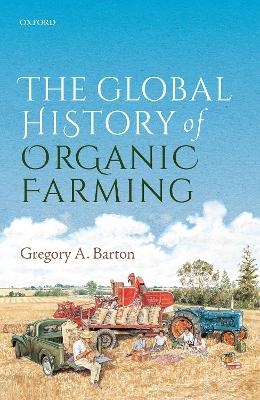
The Global History of Organic Farming
Seiten
2018
Oxford University Press (Verlag)
978-0-19-964253-3 (ISBN)
Oxford University Press (Verlag)
978-0-19-964253-3 (ISBN)
This book uncovers the untold history of the organic farming movement and its massive impact on the world of agriculture and society; how it changed our consumer habits and our ethics, pointing back to the inspiration of the agricultural past, and demanding that we think about how our food is grown and the effect our daily habits have on nature.
Organic farming is a major global movement that is changing land-use and consumer habits around the world. This book tells the untold story of how the organic farming movement nearly faltered after an initial flurry of scientific interest and popular support. Drawing on newly-unearthed archives, Barton argues that organic farming first gained popularity in an imperial milieu before shifting to the left of the political spectrum after decolonization and served as a crucial middle stage of environmentalism.
Modern organic protocols developed in British India under the guidance of Sir Albert Howard before spreading throughout parts of the British Empire, Europe, and the USA through the advocacy of his many followers and his second wife Louise. Organic farming advocates before and during World War II challenged the industrialization of agriculture and its reliance on chemical fertilizers. They came tantalizingly close to influencing government policy. The decolonization of the British Empire, the success of industrial agriculture, and the purging of holistic ideas from medicine side-lined organic farming advocates who were viewed increasingly as cranks and kooks. Organic farming advocates continued to spread their anti-chemical farming message through a small community that deeply influenced Rachel Carson's ideas in Silent Spring, a book that helped to legitimize anti-chemical concerns.
The organic farming movement re-entered the scientific mainstream in the 1980s only with the reluctant backing of government policy. It has continued to grow in popularity ever since and explains why organic farming continues to inspire those who seek to align agriculture and health.
Organic farming is a major global movement that is changing land-use and consumer habits around the world. This book tells the untold story of how the organic farming movement nearly faltered after an initial flurry of scientific interest and popular support. Drawing on newly-unearthed archives, Barton argues that organic farming first gained popularity in an imperial milieu before shifting to the left of the political spectrum after decolonization and served as a crucial middle stage of environmentalism.
Modern organic protocols developed in British India under the guidance of Sir Albert Howard before spreading throughout parts of the British Empire, Europe, and the USA through the advocacy of his many followers and his second wife Louise. Organic farming advocates before and during World War II challenged the industrialization of agriculture and its reliance on chemical fertilizers. They came tantalizingly close to influencing government policy. The decolonization of the British Empire, the success of industrial agriculture, and the purging of holistic ideas from medicine side-lined organic farming advocates who were viewed increasingly as cranks and kooks. Organic farming advocates continued to spread their anti-chemical farming message through a small community that deeply influenced Rachel Carson's ideas in Silent Spring, a book that helped to legitimize anti-chemical concerns.
The organic farming movement re-entered the scientific mainstream in the 1980s only with the reluctant backing of government policy. It has continued to grow in popularity ever since and explains why organic farming continues to inspire those who seek to align agriculture and health.
Gregory A. Barton is a noted historian of British, world, and environmental history. He is Professor of History at Western Sydney University and the University of Johannesburg, and is the author of Empire Forestry and the Origins of Environmentalism, Lord Palmeston and the Empire of Trade, and Informal Empire and the Rise of One World Culture.
1: Roots of the Organic Challenge
2: The Cultural Soil of Organic Farming
3: Albert Howard and the World as Shropshire
4: The Howards in India
5: The Search for Pre-Modern Wisdom
6: The Compost Wars
7: To the Empire and Beyond
8: The Globalization of Organic Farming
9: The 1980s to the Present
| Erscheinungsdatum | 16.04.2018 |
|---|---|
| Verlagsort | Oxford |
| Sprache | englisch |
| Maße | 162 x 236 mm |
| Gewicht | 508 g |
| Themenwelt | Geisteswissenschaften ► Geschichte ► Allgemeines / Lexika |
| Geschichte ► Allgemeine Geschichte ► Neuzeit (bis 1918) | |
| Weitere Fachgebiete ► Land- / Forstwirtschaft / Fischerei | |
| ISBN-10 | 0-19-964253-2 / 0199642532 |
| ISBN-13 | 978-0-19-964253-3 / 9780199642533 |
| Zustand | Neuware |
| Haben Sie eine Frage zum Produkt? |
Mehr entdecken
aus dem Bereich
aus dem Bereich
Europa 1848/49 und der Kampf für eine neue Welt
Buch | Hardcover (2023)
DVA (Verlag)
48,00 €
Giordano Bruno - ein ketzerisches Leben
Buch | Hardcover (2024)
C.H.Beck (Verlag)
29,90 €


